Cartoonist walks into a language lab…
Bob Mankoff gave a talk here in Madison not long ago. You may recognize Mankoff as the cartoon editor for many years at the New Yorker magazine, who is now at Esquire. Mankoff’s job involved scanning about a thousand cartoons a week to find 15 or so to publish per issue. He did this for over 20 years, which is a lot of cartoons. More than 950 of his own appeared in the magazine as well. Mankoff has thought a lot about humor in general and cartoon humor in particular, and likes to talk and write about it too.
The Ted Talk
On “60 Minutes”
His Google talk
Documentary, "Very Semi-Serious"
What’s the Language Log connection? Humor often involves language? New Yorker cartoons are usually captioned these days, with fewer in the lovely mute style of a William Steig. A general theory of language use should be able to explain how cartoon captions, a genre of text, are understood. The cartoons illustrate (sic) the dependence of language comprehension on context (the one created by the drawing) and background knowledge (about, for example, rats running mazes, guys marooned on islands, St. Peter’s gate, corporate culture, New Yorkers). The popular Caption Contest is an image-labeling task, generating humorous labels for an incongruous scene.
But it’s Mankoff's excursions into research that are particularly interesting and Language Loggy. Mankoff is the leading figure in Cartoon Science (CartSci), the application of modern research methods to questions about the generation, selection, and evaluation of New Yorker cartoons.
Read the rest of this entry »


